Oscar Pistorius trial postponed due to illness of assessor
Oscar Pistorius trial postponed due to illness of assessor
March 28, 2014 -- Updated 0758 GMT (1558 HKT)
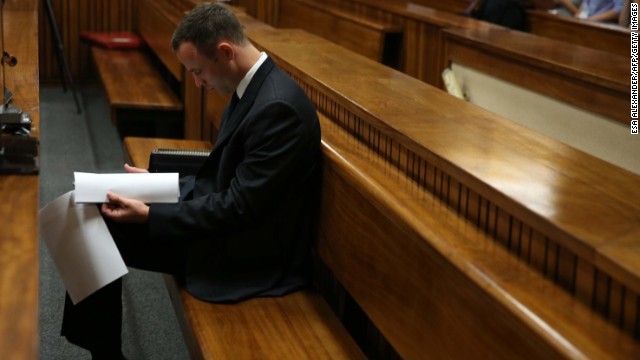
Pistorius expected to testify Friday
STORY HIGHLIGHTS
- The defense tries to convince a judge that Reeva Steenkamp's death wasn't murder
- Did Oscar Pistorius know his girlfriend was behind a door when he shot and killed her?
- And if he did not, did he act as a reasonable person would have?
- Experts in ballistics, pathology and psychiatry will try to support Pistorius' story
The assessors will help the judge decide the verdict. South Africa does not have jury trials.
But was it murder?
One of South Africa's toughest prosecutors, Gerrie Nel, has been fighting for most of this month to prove it was.
On Friday, one of the country's shrewdest defense lawyers, Barry Roux, was scheduled to begin convincing a judge that it wasn't.
Now he will have to wait.
The verdict will hinge on two questions:
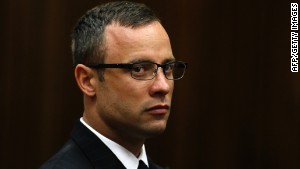 Pistorius testimony key to defense case
Pistorius testimony key to defense case
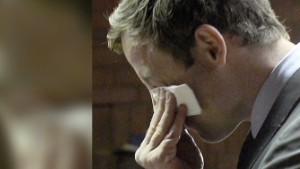 Prosecution rests in Pistorius trial
Prosecution rests in Pistorius trial
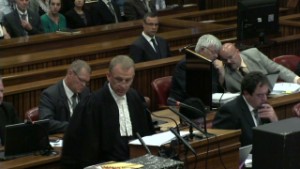 Pistorius witness: I heard screaming
Pistorius witness: I heard screaming
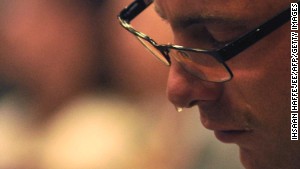 Pistorius vomits and weeps in court
Pistorius vomits and weeps in court
Did the Olympic sprinter
know his girlfriend was behind the door in the bathroom of his house
when he fired four hollow-point bullets through it in the middle of the
night?
And if he did not -- if he thought she was a burglar, as he insists -- did he act as a reasonable person would have?
Critical testimony will come from the only living person who was in the house at the time, the "Blade Runner" himself.
Pistorius was expected
to take the stand for the first time Friday to give his side of a story
he's been telling for more than a year.
He woke up in the middle
of the night, went to his balcony to bring in a fan -- or two fans, in
his most recent version -- heard his bathroom window opening, took his
gun, went to the bathroom and fired through the door when he heard a
noise in the toilet.
"It was pitch dark in
the bedroom, and I thought Reeva was in bed," he testified when he
applied for bail in the days after the killing.
In that version of the
story, Pistorius emphasized that he "felt a sense of terror" when he
heard the noise, that he "felt extremely vulnerable" because he was not
wearing his prosthetic legs, and that he "has been a victim of violence
and of burglaries before."
And, he said, "We were deeply in love and I could not be happier."
If Judge Thokozile
Matilda Masipa believes that story, Pistorius could be acquitted of
murder. She could find him guilty of the lesser charge of culpable
homicide -- similar to what would be called manslaughter in the United
States -- or find him not guilty at all.
The defense is likely to rely on three types of experts to support Pistorius' story:
Ballistics
Pistorius fired four
shots. Three hit Steenkamp: one in the hip, one in the arm and one in
the head. The shot to the head probably killed her almost instantly.
But when did that shot
hit her? The prosecution says it hit her last. That means she would have
been able to scream between shots -- potentially giving Pistorius a
moment to realize his mistake and stop shooting.
Defense lawyer Barry
Roux rejected the prosecution's order of shots, though, in a heated
exchange with police Capt. Christian Mangena, the prosecution ballistics
expert.
Roux said the defense
ballistics expert would show that the order of shots was different, and
that Pistorius fired the four shots in two quick bursts -- two "double
taps."
Mangena said it was
"impossible" for the pattern of wounds on the body to be the result of
two double taps, ultimately leaving Roux sighing dismissively and
promising that his own ballistics expert would explain.
Pathology
Oscar Pistorius threw up
repeatedly as Gert Saayman, who performed the autopsy on Steenkamp,
described the devastating wounds Pistorius inflicted on her.
But as gruesome as the
testimony was, it is not critical to the state's case -- there's no
doubt, after all, who killed Steenkamp or how.
The most damning thing
Saayman said was far less dramatic. Based on the contents of her
stomach, the pathologist suggested that Steenkamp had probably eaten
around 1 a.m., about two hours before she died.
That's a direct
contradiction of Pistorius' story that they were in the bedroom by about
10 p.m., her doing yoga and him watching television, and that they went
to sleep after she finished her yoga.
Roux hammered Saayman on
the question of when Steenkamp last ate, going so far as to bring in
academic articles for the pathologist to read, a clear sign that the
defense considers it crucial to rebut that point.
Saayman did not budge.
A pathologist who attended the autopsy on behalf of Pistorius, Reggie Perumal, is due to testify for the defense.
A police cell phone
expert also may have found a similar inconsistency with Pistorius'
timeline. Capt. Francois Moller, who downloaded the contents of
Pistorius' iPhone, said it made an Internet connection for about five
minutes an hour and 20 minutes before the shooting. The defense may put
forward an expert of their own to explain.
Psychiatry
Pistorius needs the
judge to believe not only that there is a chance he made a genuine
mistake in thinking Steenkamp was a burglar, but that his response was
reasonable.
Sean Rens, a gun dealer
who was selling a small arsenal to Pistorius at the time of the killing,
testified that the athlete had passed a test showing he knew what the
law said about firing in self-defense.
On the face of it, what
Pistorius did in firing through a closed door, when he could not see an
imminent threat, was neither legal nor safe, the Rens testimony
suggested.
But a psychiatrist may
argue that Pistorius should be judged by a different standard of
reasonableness because he is a double amputee who was not wearing his
prosthetics at the time.
His statement at his
bail hearing implied that he should: "As I did not have my prosthetic
legs on and felt extremely vulnerable, I knew I had to protect Reeva and
myself. ... I felt trapped as my bedroom door was locked and I have
limited mobility on my stumps."
If the judge accepts that as true, Oscar Pistorius' disability could prove to be his greatest defense.
Comments